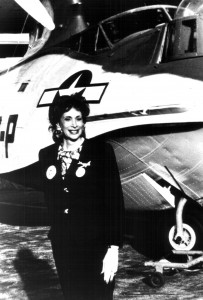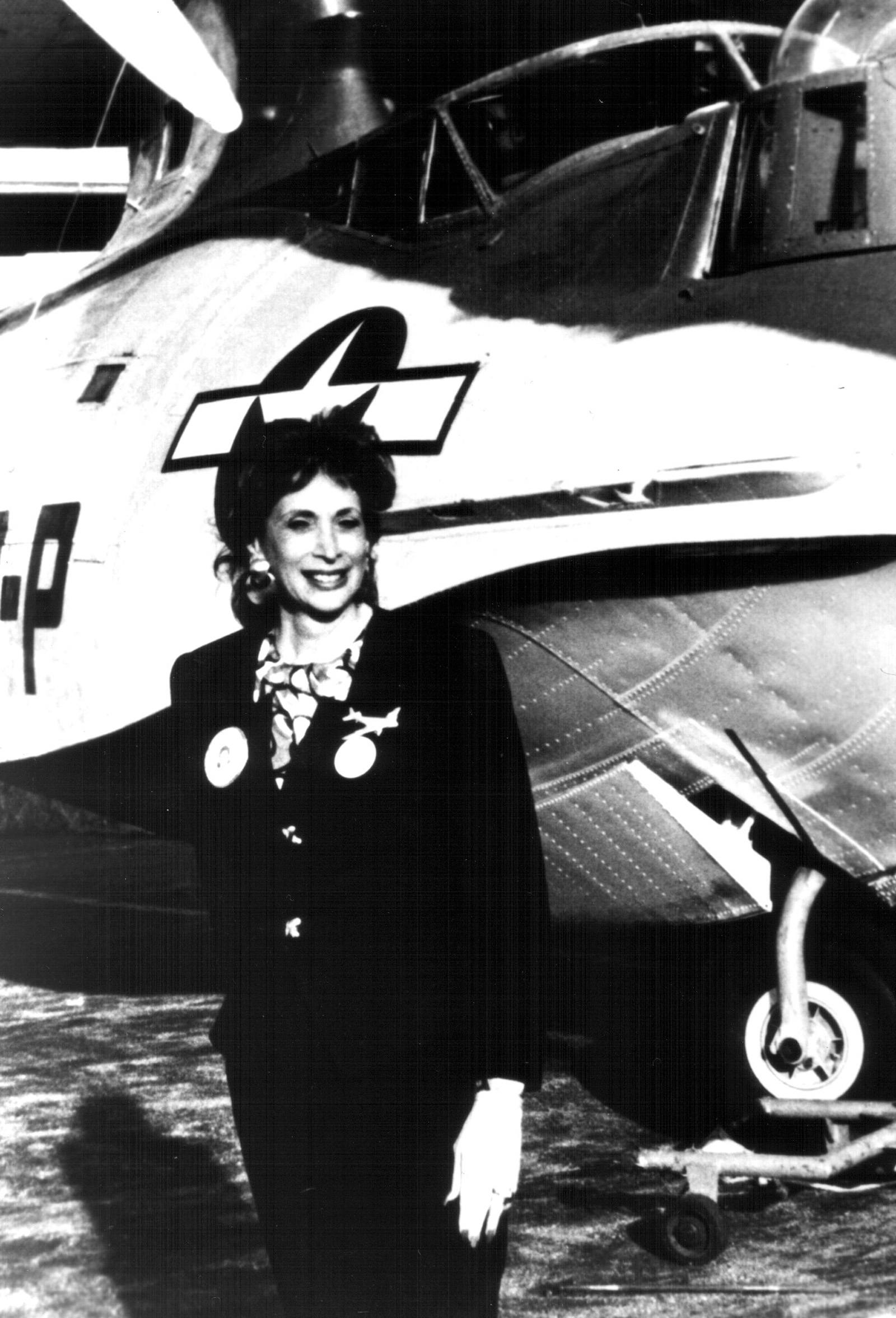By Henry M. Holden
Recently, the New Jersey Aviation Association announced the appointment of Arlene Feldman as its new president. The NJAA is an organization dedicated to the promotion, enhancement and protection of New Jersey’s aviation industry.

Arlene Feldman has been a pilot for close to 40 years. As the new president of the New Jersey Aviation Association, her goal is to defend and promote the interests of the state’s aviation industry.
“I’m extremely enthusiastic at this opportunity to serve New Jersey, once again, through NJAA, which I call the ‘Voice of New Jersey Aviation,'” Feldman said. “I have been gratified by the number of high-level aviation executives and elected officials who have volunteered to support and assist us in all our endeavors.”
Feldman has actively supported aviation for more than two decades. One of her first efforts was in 1978, when she was called upon to help form Professional Women Controllers, Inc. Jacque Smith Burdett and Sue Mossert Townsend knew Feldman as a lawyer and a pilot, and went to her for legal advice. Feldman helped them incorporate the association, and continued to offer guidance and assistance whenever needed. In January 1980, she was recognized for her efforts when the organization granted her its first honorary membership. She later became the first woman elected to head the board of directors of the Air Traffic Control Association.
Feldman graduated cum laude from the University of Colorado with a degree in political science. She went on to earn a law degree, in 1978, from Temple University. She attended law school full?time, while holding a job and raising her family.
After passing the bar exam, Feldman’s first job was a supervising attorney with the United States Railway Association. She was able to combine work and an interest in aviation in 1982, when she was selected to become New Jersey’s director of aeronautics. In that capacity, Feldman helped write legislation and headed a bipartisan effort that established the New Jersey State Aviation Trust Fund, which provided for the financing of capital improvements for public and private airports not qualified for federal funding.
Feldman updated the state’s aviation regulations and was on the leading edge of the fight to have legislation that required local zoning guidelines to protect small airports. This legislation created safety zones, which stopped a longstanding practice of developers building up to and encroaching on the ends of runways. She also dedicated much time to developing aviation education in public schools and supporting programs to stimulate aviation interest and awareness in both children and adults.
Feldman’s success at her first aviation job led to more challenging endeavors. In 1984, she became deputy director, and later acting director of the FAA’s Technical Center in Atlantic City, N.J., the nation’s leading aviation research and development facility. While there, she pioneered the national and international advancement of rotorcraft technology.
Success breeds success, and for Feldman, this meant another challenging assignment, as deputy director of the FAA Western?Pacific region in Los Angeles, the FAA’s largest region. There she supervised more than 5,300 employees and managed the closing and reopening of a major runway at LAX without significant disruptions, flight delays or revenue loss. She also served as principal spokesperson to the Los Angeles media.
In 1988, Feldman became the first female Eastern regional administrator for the FAA, and in 1994, she was appointed the first female director of that region, the busiest in the country. She admits that at one time, the FAA would never have dreamed of having a female regional administrator, much less a director, but times have changed.
“Qualifications override gender these days,” she said.
As director, she established an effort to recruit women and minorities into top FAA positions, and created a region-wide mentoring program, which became a model for other regions. These challenges didn’t happen by accident or coincidence. Her experience and education were tools she used in order to advance in the once all-male world of FAA management.
Feldman is a persistent advocate of two-way communication. Perhaps the most important skills, and the ones which Feldman thinks are the most ignored, are the interpersonal skills of oral and written communication.
“I’ve read that one of the marks of real intellect is the ability to communicate with the genius and the fool,” she says. “If you can’t tell somebody what you know, it doesn’t matter what you know.”
Practicing what she preaches, she established a community outreach program as the first step in recognizing community concerns about aircraft noise in the Northeast. These efforts led to an airspace redesign, which reduced noise and increased efficiency.
Feldman retired from the FAA in September 2005. Upon her retirement, Phil Boyer, president of the Aircraft Owners and Pilots Association, presented her with the organization’s presidential citation.
“Arlene has been a true public servant, in the best sense of the phrase,” said Boyer. “Not only has she paved the way for many women in aviation, but she has also been a true friend and defender of general aviation.”
Feldman recently said that those in the field of aviation face many challenges.
“I stand ready, willing and able to meet the many challenges that New Jersey aviation continues to face,” she said. “Our mission is to defend and promote the interests of every facet of our state’s aviation industry, and to offer our support, when needed, to our partners in the national aviation organizations.”
Feldman mentioned that one of New Jersey’s biggest problems is the lose of airports.
“As president of NJAA, I’d like to work with all the parties who are involved with airports,” she said. “We want to insure that New Jersey has a safe and efficient transportation system. One of the biggest components of that system is aviation. We need to promote it and protect it. Anything that falls within that category is something that I hope NJAA will be involved in. NJAA will serve as the aviation ‘clearing house,’ providing information on any and all aviation matters to our state legislature, our national leaders, and to the media.”
Feldman said the organization will become even more involved in aviation matters.
“A lot of people have the perception that we only represent the business aviation community, when in fact, we represent all of the aviation interests in New Jersey,” she said. “With that in mind, I’m hoping we’ll be able to protect the system, save airports and prevent any legislation that will be detrimental to aviation. At the same time, I think it’s important that we work with the community. While aviation contributes greatly to the economy, we also have to ensure that the economics of aviation is compatible with the surrounding communities. That’s going to be a very challenging thing to do.
Feldman said that as NJAA defends and promotes the interests of the industry, the organization will attempt to balance the industry needs with local concerns, especially as they apply to airports.
“My interest in preserving airports is reflected in the fact that during my tenure with the state, with the assistance of so many, we did not lose a single airport,” she said. “We’re planning some events that will bring together all the airport owners, FBOs, pilots and businesses, and will open lines of communication so we can respond to what our constituents want us to do. That’s important; we really have to hear from our constituents.”
She said the organization is currently sending out mailings, looking for new membership.
“In membership, there is strength,” she said. “NJAA has been kind of quiet for awhile, but we’re getting back into the mainstream of aviation. I call it a new day in aviation, where we’re going to approach things a little bit differently. I think we need to get as many members behind us as possible. With the membership comes the financial support, and with the membership behind us, we’ll be able to do a lot of the things we have in mind to do.”
Feldman has been recognized over the years for her achievements in aviation. She’s been honored by Helicopter Association International, has worked closely with the Eastern Region Helicopter Council and has helped to establish a number of heliports. She’s also participated in the FAA’s heliport design team, and helped prevent legislation that would have been detrimental to the helicopter industry. She’s a lifetime honorary member of both the ERHC and the New England Helicopter Pilots Association. In 1997, she was inducted into the New Jersey Aviation Hall of Fame, and in 2004, she was inducted into the Women in Aviation Hall of Fame.
For information on the New Jersey Aviation Association, visit [http://www.njaviation.org].











